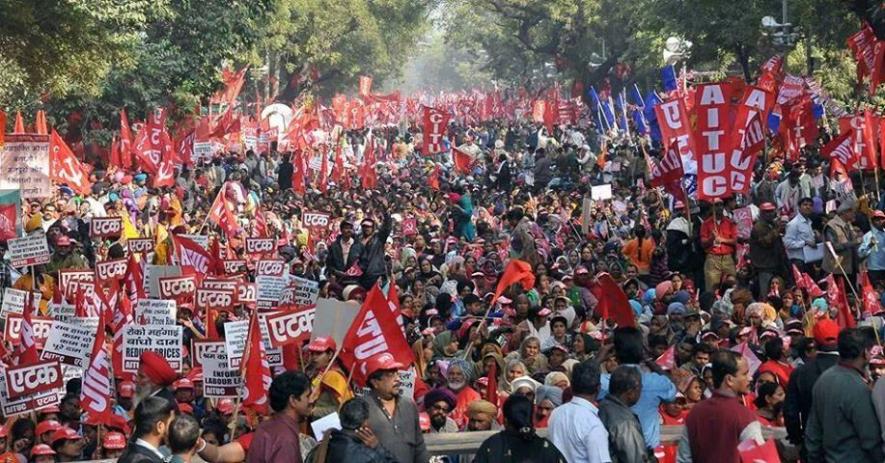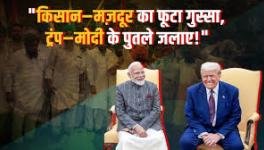Big Bang’ Reform Push by Modi 2.0 Govt to Target Workers’ Rights

Representational Image. Image Coutesy: Thozhilalar koodam
Rajiv Kumar, the Vice Chairman of government think-tank NITI Aayog, in an interview with Reuters, said that the first 100 days of the Modi 2.0 government will be marked by a volley of major economic reforms. These reforms, he said, are meant to entice foreign investors, and will include changes in labour laws, privatisation and creation of land banks for new industrial development.
According to Kumar, reforms in India’s 'complicated ' labour laws will be pushed for in the next parliamentary session, scheduled to be held in July. The government proposes to place a new Bill before the Lower House for its approval. The Bill will aim to combine 44 central labour laws into four codes – wages, industrial relations, social security and welfare, and the fourth – occupational safety, health and working conditions.
Kumar also said that the proposed changes in labour laws would help companies avoid getting stuck in a series of complicated disputes with their workers a that involve regulations set by authorities at different levels of government and can lead to long, drawn-out adjudication in various parts of the legal system.
The bid for labour law changes is not new, neither is Kumar's reasoning for the same. When the Bharatiya Janata Party (BJP) came to power in 2014, it had proposed to combine of 44 central laws into four codes.
Also Read: India’s Urban and Rural Working Class to Embark on Nationwide Strike in January 8-9
These changes, being done for ‘Ease of Doing Business’, will work only in favour of big industrialists whose profits will rise even as workers toil and their work conditions worsen. The BJP was cautious with these reforms in their previous term, as they did not have a majority in Rajya Sabha. Also, it to face the wrath of trade unions on the ground. This had caused them to adopt a different strategy wherein they pushed for labour law changes at the state level, as they were ruling in many states. Labour laws are in the concurrent list in the Constitution, meaning legislative power is shared by the states and the Centre. Until last year, 22 out of 29 states were ruled by a BJP government. All these states, and some in which other parties are at the helm, had alowed changes in labour laws on the lines dictated by the central government.
After a massive victory in the 2019 electoral war, the BJP government is once again set to share the spoils with their friends. Hence, yet again, they are pushing for a change in 'complicated' labour laws.
Labour laws in India, though not very efficient, to a certain extent ensure the worker's safety, and grants the workers the right to collective bargaining and to challenge unjust decisions of employers. This is why the existence of these laws are seen to 'complicate' things for employers and the authorities concerned as, to some extent, these hold them accountable for violations.
The past five years were marked with workers' strikes against several economic measures taken by the Modi government. In 2015, a one-day country-wide strike against Modi’s rule was observed on September 2. This was followed by another one-day strike in 2016. In 2017, a three-day Mahapadav of workers was organised in Delhi to press for the same demands in which over two lakh workers joined in from all over the country. In August 2018, workers joined farmers for a jail bharo agitation and nearly five lakh people courted arrest in 394 districts of the country. This was followed by a historic march to Parliament on September 5, jointly called by trade unions and farmers and farm workers unions. The beginning of the year, started with the general strike on January 8 and 9.
Read Also: #WorkersStrikeBack: Workers Resolve in Delhi to Stand Unhindered for Their Rights
In order to attract foreign investors, the BJP-led government also plans to create land banks by getting access to large amounts of unutilised Indian government land. This move, too, is aimed at reducing major legal challenges over ownership and development for private companies, especially foreign ones.
Notably, foreign direct investment (FDI) inflows into India slowed down to a five-year low, according to official data. FDI in 2017-18 grew by just 3% to $44.85 billion compared with 8.67% in 2016-17, 29% in 2015-16, 27% in 2014-15, and 8% in 2013-14.
The myth that India needs to attract foreign capital to generate jobs and increase growth has been shattered by these figures. Studies have shown that FDI does not give any significant push to job creation. Foreign capital, especially today’s very mobile and volatile foreign capital – flows in and out of countries solely on the basis of quick profitability.
Meanwhile, the Modi government has also set its sight on disinvesting in more than 42 state-controlled companies, which it intends to privatise or completely close in the coming months.
The government is even planning to lift the FDI cap on national carrier Air India to make its sale easier.
While the Modi government got a massive mandate for the second term, it is a fact that its performance on the economic front was very poor – be it job growth or the agrarian crisis. In fact, India’s economic growth rate decelerated to a five-quarter low of 6.6% in the last three months of 2018, and is expected to fall further in the January-March quarter due to a sharp drop in consumption.
However, Kumar put the blame for the slump in economic growth on stressed balance sheet of banks and a crisis in the shadow lending industry.
“We should (start with the banks)..There will be big bang, there will be 100 days action. We are all geared for that … I have maintained that the fiscal policy should be counter cyclical. There is scope for that,” he said, hinting at bank consolidation plans.
The nature of the reforms that the newly re-elected Modi government seeks to push forth makes it crystal clear that they want swift and an agressive neoliberal policy changes. They envision a society where the major chunk of people are poor, illiterate, jobless, indebted, with lack access to decent healthcare, while a few people lead lavish lives.
The writer is a student in Shiv Nadar University, Uttar Pradesh, and is interning with Newsclick.
Get the latest reports & analysis with people's perspective on Protests, movements & deep analytical videos, discussions of the current affairs in your Telegram app. Subscribe to NewsClick's Telegram channel & get Real-Time updates on stories, as they get published on our website.
























